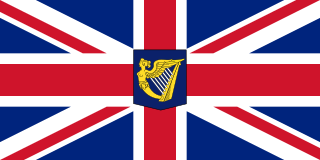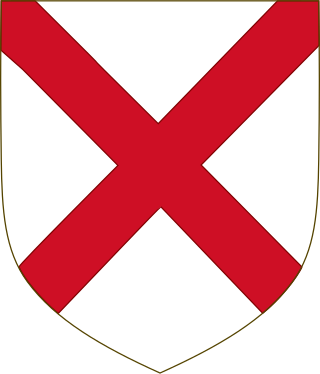| |||||
| Centuries: | |||||
|---|---|---|---|---|---|
| Decades: | |||||
| See also: | Other events of 1496 List of years in Ireland | ||||
Events from the year 1496 in Ireland.
| |||||
| Centuries: | |||||
|---|---|---|---|---|---|
| Decades: | |||||
| See also: | Other events of 1496 List of years in Ireland | ||||
Events from the year 1496 in Ireland.

Earl of Cork is a title in the Peerage of Ireland, held in conjunction with the Earldom of Orrery since 1753. It was created in 1620 for Richard Boyle, 1st Baron Boyle. He had already been created Lord Boyle, Baron of Youghal, in the County of Cork, in 1616, and was made Viscount of Dungarvan, in the County of Waterford, at the same time he was given the earldom. These titles are also in the Peerage of Ireland.

Lord Lieutenant of Ireland, or more formally Lieutenant General and General Governor of Ireland, was the title of the chief governor of Ireland from the Williamite Wars of 1690 until the Partition of Ireland in 1922. This spanned the Kingdom of Ireland (1541–1800) and the United Kingdom of Great Britain and Ireland (1801–1922). The office, under its various names, was often more generally known as the Viceroy, and his wife was known as the vicereine. The government of Ireland in practice was usually in the hands of the Lord Deputy up to the 17th century, and later of the Chief Secretary for Ireland.

Edward George Geoffrey Smith-Stanley, 14th Earl of Derby,, known as Lord Stanley from 1834 to 1851, was a British statesman and Conservative politician who served three times as Prime Minister of the United Kingdom. To date, he is the longest-serving leader of the Conservative Party. He is one of only four British prime ministers to have three or more separate periods in office. However, his ministries each lasted less than two years and totalled three years and 280 days. Derby introduced the state education system in Ireland, and reformed Parliament.

Charles Grey, 2nd Earl Grey, known as Viscount Howick between 1806 and 1807, was a British Whig politician who served as Prime Minister of the United Kingdom from 1830 to 1834. He was a descendent of the House of Grey and the namesake of Earl Grey tea. Grey was a long-time leader of multiple reform movements, and during his time as prime minister his government brought about two notable reforms. The Reform Act 1832 enacted parliamentary reform, greatly increasing the electorate of the House of Commons.

The title Duke of Abercorn is a title in the Peerage of Ireland. It was created in 1868 and bestowed upon James Hamilton, 2nd Marquess of Abercorn. Although the Dukedom is in the Peerage of Ireland, it refers to Abercorn, West Lothian, and the Duke also bears four titles in Peerage of Scotland and two in the Peerage of Great Britain, and is one of only three peers who have titles in those three peerages. The Duke of Abercorn also claims the French title of Duke of Châtellerault, created in 1548.

The FitzGerald dynasty is a noble and aristocratic dynasty of Cambro-Norman and Anglo-Norman origin. They have been peers of Ireland since at least the 13th century, and are described in the Annals of the Four Masters as having become "more Irish than the Irish themselves" or Gaels, due to assimilation with the native Gaelic aristocratic and popular culture. The dynasty has also been referred to as the Geraldines and Ireland's largest landowners. They achieved power through the conquest of large swathes of Irish territory by the sons and grandsons of Gerald de Windsor. Gerald de Windsor was the first Castellan of Pembroke Castle in Wales, and became the male progenitor of the FitzMaurice and FitzGerald Dynasty. His father, Baron Walter FitzOther, was the first Constable and Governor of Windsor Castle for William the Conqueror, and was the Lord of 38 manors in England, making the FitzGeralds one of the "service families" on whom the King relied for his survival.
The Lord Deputy was the representative of the monarch and head of the Irish executive under English rule, during the Lordship of Ireland and then the Kingdom of Ireland. He deputised prior to 1523 for the Viceroy of Ireland. The plural form is Lords Deputy.
Events from the year 1686 in Ireland.
Events from the year 1668 in Ireland.
Events from the year 1513 in Ireland.
Events from the year 1382 in Ireland.
The following is a list of events that occurred in the year 1344 in Ireland.
Events from the year 1331 in Ireland.
Events from the year 1420 in Ireland.
Following the enactment of the House of Lords Act 1999, the number of hereditary peers entitled to sit in the House of Lords was reduced to ninety-two. The Earl Marshal and the Lord Great Chamberlain were entitled to sit ex officio; the remaining ninety were elected by all the hereditary peers before the passing of the reform. Since November 2002, by-elections have been held to fill vacancies left by deaths, resignations or disqualifications of those peers. Since the passing of the House of Lords Reform Act 2014, by-elections have also been held to fill vacancies left by the retirements of those peers.
Events from the year 1234 in Ireland.
Events from the year 1687 in Ireland.
Events from the year 1576 in Ireland.
Events from the year 1484 in Ireland.
Events from the year 1557 in Ireland.